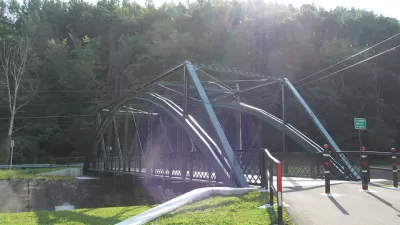In California, a billion gallons of water ends up in the ocean every day. A new bill seeks to curb this practice by requiring treatment facilities to increase recycling and reuse efforts.

California legislators want to see less rainwater discharged into the Pacific Ocean and state estuaries. "SB 332, the Local Water Reliability Act, calls on wastewater treatment facilities to step up recycling, conservation and efficiency to meet reduction targets of 50 percent by 2030 and 95 percent by 2040 for the amount of water dumped into the ocean," reports Kevin Modesti.
State Senators Bob Hertzberg and Scott Wiener, the bill’s backers, say that California communities often use water once and then dispose of it, up to 1.1 billion gallons a day. "Hertzberg cited a climatologist’s estimate, reported in the Los Angeles Times, that more than 80 percent of the region’s rainfall ends up diverted from urban areas in Southern California into the Pacific Ocean," notes Modesti.
They argue that the water should be recycled and used for landscape and agricultural irrigation to reduce the practice of diverting water to Southern California from the Colorado River and the Bay-Delta watershed in the northern part of the state.
Hertzberg backed a similar bill in 2015 that faced opposition from water agencies citing the immense costs that would come along with reuse mandates. The earlier bill did not get past the committee level, but the Association of California Water Agencies has not yet taken an official stance on the latest bill.
FULL STORY: See all that water flowing into the ocean? Bill by Sen. Hertzberg aims to save it

Alabama: Trump Terminates Settlements for Black Communities Harmed By Raw Sewage
Trump deemed the landmark civil rights agreement “illegal DEI and environmental justice policy.”

Planetizen Federal Action Tracker
A weekly monitor of how Trump’s orders and actions are impacting planners and planning in America.

Why Should We Subsidize Public Transportation?
Many public transit agencies face financial stress due to rising costs, declining fare revenue, and declining subsidies. Transit advocates must provide a strong business case for increasing public transit funding.

Understanding Road Diets
An explainer from Momentum highlights the advantages of reducing vehicle lanes in favor of more bike, transit, and pedestrian infrastructure.

New California Law Regulates Warehouse Pollution
A new law tightens building and emissions regulations for large distribution warehouses to mitigate air pollution and traffic in surrounding communities.

Phoenix Announces Opening Date for Light Rail Extension
The South Central extension will connect South Phoenix to downtown and other major hubs starting on June 7.
Urban Design for Planners 1: Software Tools
This six-course series explores essential urban design concepts using open source software and equips planners with the tools they need to participate fully in the urban design process.
Planning for Universal Design
Learn the tools for implementing Universal Design in planning regulations.
Caltrans
Smith Gee Studio
Institute for Housing and Urban Development Studies (IHS)
City of Grandview
Harvard GSD Executive Education
Toledo-Lucas County Plan Commissions
Salt Lake City
NYU Wagner Graduate School of Public Service




























